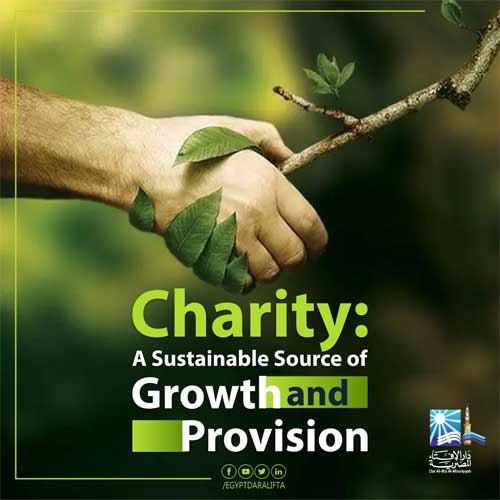Charity: A Sustainable Source of Growth and Provision

Charity, known as 'Sadaqah' in Arabic, holds a central place in the teachings and practices of Islam. Far beyond mere philanthropy, it is deeply ingrained as a principle of sustainable provision and growth within the Muslim community and among family members. The multifaceted role that charity plays in Muslims' lives fosters not only material support but also spiritual enrichment and societal cohesion. In light of this, can charity serve as a source of growth and provision amidst the economic recession witnessed worldwide?
A Means to Spiritual Growth and Fulfilment
In Islamic tradition, charity encompasses a broad spectrum of acts beyond financial donations. It includes kindness, compassion, and benevolent deeds towards others, whether through monetary contributions, voluntary service, or even a smile. The primary texts (Quran and Sunnah) emphasize the virtue of giving generously and consistently, portraying charity as a means of purifying one's wealth and soul while earning divine favor. God Almighty commands the believers, "O believers! Donate from the best of what you have earned and of what We have produced for you from the earth" (Quran 2:267). Prophet Muhammad (peace be upon him) also commanded us to never be stingy and to seek blessings and prosperity through paying charity. Abu Hurairah (may God be pleased with him) narrated that the Messenger of God (peace be upon him) said, "Charity does not decrease wealth" [Muslim]."
Charity cultivates spiritual growth and fulfillment for both the giver and the recipient. Through acts of generosity, Muslims emulate the attributes of compassion and selflessness exemplified by Prophet Muhammad (peace be upon him). Giving charity is seen as an expression of gratitude towards God for His blessings, fostering humility, empathy, and a sense of interconnectedness with fellow human beings. God Almighty says, "Kind words and forgiveness are better than charity followed by injury. And God is Self-Sufficient, Most Forbearing" (Quran 2:263). This Quranic injunction guides Muslims on the sublime morals of giving charity as a means of growth and fulfillment.
Giving charity must be void of humiliation or disgrace from the giver's part to the recipient. In this respect, charity transcends individual acts of benevolence to foster communal solidarity and cohesion.
The Pursuit of Sustainable Provision
The pursuit of sustainability has become a global imperative in response to mounting environmental, social, and economic challenges, from climate change and resource depletion to poverty and inequality. Henceforth, charity is viewed as a means of achieving sustainable provision in Islam, both individually and collectively. By sharing wealth with those in need, Muslims fulfill their obligation of "zakat" (obligatory almsgiving), which redistributes wealth within society, mitigates poverty, and fosters economic equilibrium. God Almighty says, "Zakat (obligatory almsgiving) is only for the poor and the needy, for those employed to administer it, for those whose hearts are attracted ˹to the faith˺, for ˹freeing˺ slaves, for those in debt, for God's cause, and for ˹needy˺ travelers. This is an obligation from God. And God is All-Knowing, All-Wise" (Quran 9:60).
Voluntary acts of charity beyond zakat, on the other hand, serve to further uplift marginalized communities, promote social justice, and stimulate economic empowerment. 'Adi ibn Hatim heard the Messenger of God (peace be upon him) saying, "Save yourself from Hell-fire even by giving out half a date-fruit in charity" [Bukhari]. This hadith guides us on observing giving charity at all times and under any circumstances to save ourselves from the trials of this world and hellfire in the hereafter. This makes charity a pillar of safety and prosperity in Muslims' lives.
Investing in God's Bounties
While charity remains integral to Islamic principles, contemporary challenges such as poverty, conflict, and inequality necessitate innovative approaches to philanthropy. Embracing technology, promoting sustainable development projects, and enhancing financial literacy can amplify the impact of charitable endeavors and ensure long-term sustainability. Furthermore, fostering a culture of giving among the affluent and empowering grassroots initiatives can harness the transformative potential of charity to address systemic injustices and promote inclusive growth.
The first step towards implementing this starts among the members of the family. It is the role of parents to raise children on the love of giving without seeking a reward except from God, which is the source of attaining God's pleasure as per His words, "You will never achieve righteousness until you donate some of what you cherish. And whatever you give is certainly well known to God" (Quran 3:92).
God Almighty says, "Say, O Prophet, 'Surely it is my Lord Who gives abundant or limited provisions to whoever He wills of His servants. And whatever you spend in charity, He will compensate you for it. For He is the Best Provider'" (Quran 34:39).
In light of this, charity serves as a cornerstone of sustainable provision and growth in Islam, embodying principles of compassion, justice, and stewardship. By embracing the holistic concept of charity, Muslims can contribute to building resilient communities, nurturing spiritual fulfillment, and advancing collective prosperity. Through steadfast commitment to charitable values and innovative approaches, Islam's tradition of giving can continue to inspire positive change and shape a more equitable and compassionate world as per the words of God, "Let the man of wealth provide according to his means. As for the one with limited resources, let him provide according to whatever God has given him. God does not require of any soul beyond what He has given it. After hardship, God will bring about ease" (Quran 65: 7).
 Arabic
Arabic French
French Deutsch
Deutsch Urdu
Urdu Pashto
Pashto Swahili
Swahili Hausa
Hausa

